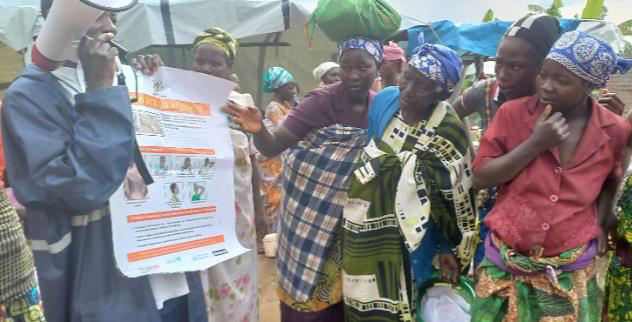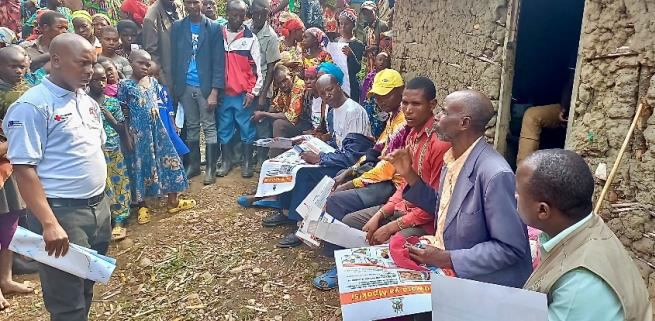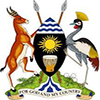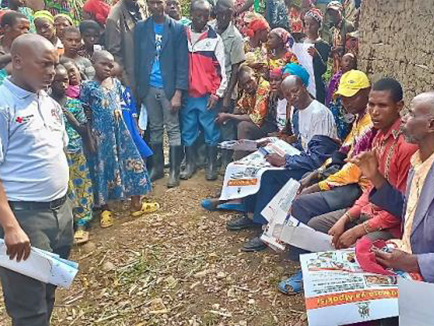On September 17th, a combined team from Kisoro district Risk Communication and Community Engagement pillar (RCCE) and the Ministry of Health, led by District Health Educator (DHE) Valentino Mubangizi, set out to engage with local leaders and communities in Serwaba market, located 34 kilometers northwest of Kisoro town. This effort was part of USAID SBCA’s collaboration with the Ministry of Health, Kigezi PHEOC, WHO, UNICEF, and USAID Uganda Health Activity to curb the spread of Mpox in high-risk areas.
Upon arrival at Serwaba, which lies near the porous Uganda-DRC border and attracts over 500 traders from both countries every Tuesday, the team was met with bustling market activity. Speaking to the team, Mr. Uwiringiyimana Laurent, the LC III chairperson of Nyabwishenya sub county, expressed gratitude for the team’s visit and emphasized the importance of sharing the information provided, especially with the Congolese community, who often resist adopting preventive measures. He recognized the significant influence of local leaders and their role in ensuring the community takes Mpox and other threats seriously.
The District Health Educator, Mr. Mubangizi, immediately began engaging the local leaders by first assessing their knowledge of Mpox and its potential threat to their livelihoods. One of the leaders expressed doubt, citing the community’s long-standing practice of eating monkey meat without any previous health concerns. However, Mr. Mubangizi, with his calm demeanor, explained the seriousness of Mpox and its potential spread through human-to-human transmission. He emphasized the importance of early detection and vigilance, urging leaders to educate their communities on recognizing symptoms like fever, rash, and swollen lymph nodes.
As the discussion progressed, a larger crowd of traders gathered around, curious about the conversation between their leaders and the health team. To address this growing interest, the RCCE team quickly shifted into a broader engagement. They equipped newly oriented leaders with megaphones, flyers, and posters, allowing them to disseminate vital Mpox information directly to the marketgoers. During the session, Mr. Mubangizi highlighted the risks of consuming wild animal meat, specifically monkey meat, which was a common practice among some Congolese traders in the area. He explained how this could lead to the spread of zoonotic diseases like Mpox. The RCCE team also provided leaders with translated talking points, flyers, and posters to ensure they could effectively communicate preventive measures to their communities.
Ministry of Health official, Mr. Muganga Edward, urged the leaders to take a proactive stance and lead by example in preventing Mpox transmission. He encouraged them to report any suspected cases through toll-free lines that are now available in their community to enable health authorities to respond swiftly. Given the proximity of Serwaba market to the DRC and the high volume of cross-border trade, such community engagements are crucial in raising awareness and preventing the spread of Mpox and other infectious diseases. By empowering local leaders with the knowledge and tools to engage their communities, USAID SBCA and its partners are making significant strides in controlling the outbreak in these vulnerable areas.


Getting to the communities: Left, a Kisoro DTF member leading an orientation of community leaders in Serwaba. A community leader using a megaphone and poster to educate women about Mpox in Serwaba market in Kisoro district.


